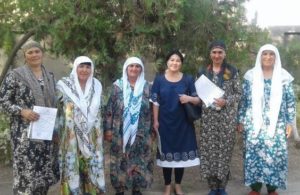
In June 2017, dehkan farm shareholders Ms. Shakarova Najafmo, Ms. Kasirova Olambibi, Ms. Shakarova Taqdir, Ms. Nodirova Zuhro, and Ms. Kholiyorova Ashurvi approached the Feed the Future Tajikistan Land Market Development Activity seeking legal assistance to aid in a dispute with their dehkan farm head. The five women are shareholders of dehkan farm “Sharifjon”, located in Nosiri Khisrav jamoat within Qabodiyon district. In 2016, a dispute arose between the shareholders of “Sharifjon” and the head of the dehkan farm due to the latter’s refusal to pay farmer salaries, violations of the shareholders’ rights to decide what to grow, and unequal distribution of the farm’s income. When farmers sought to withdraw their land shares and create a separate dehkan farm, the local government informed them that, as of October 2013, the dehkan farm did not include them as documented shareholders.
Complaints filed by shareholders at the jamoat and district levels, as well as with the land management committee, did not yield results. Resolution of the dispute was critical for the women, as their land shares are their only source of income and means to feed their families.
Lawyers on staff with the Feed the Future Tajikistan Land Market Development Activity provided legal assistance to the shareholders. Ms. Nodira Sidykova, LMDA Deputy Chief of Party, met with the shareholders, listened to their complaints, and studied their land use rights documents. This examination found that the dehkan farm head had falsified the documents in order to deprive the women shareholders of their shares and distribute them to other farmers.
After finding this proof of illegal exclusion from membership, project lawyers prepared and submitted a claim on behalf of the women to the Economic Court of Khatlon region. Ms. Sidykova defended the farmers’ interests in the court, which found that since October 2013 the five women had been illegally removed from the dehkan farm, with their land shares given to other individuals. On September 22, 2017, the court decided in favor of the shareholders and returned their land shares to them.
This success is just one example of the benefits of increased legal protection for rural populations, which will continue to be supported by the Feed the Future Tajikistan Land Market Development Activity through Legal Aid Center grantees providing daily consultations and information services to farmers and holders of land use rights in Khatlon region.

